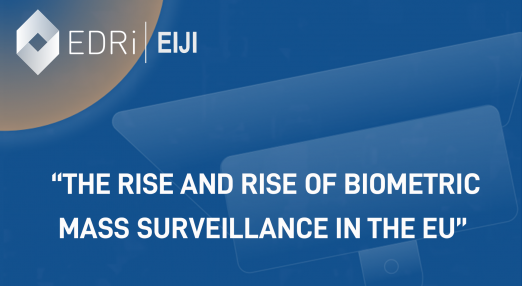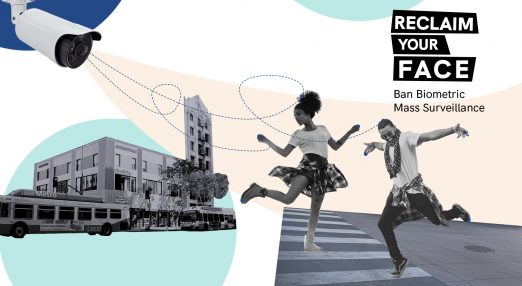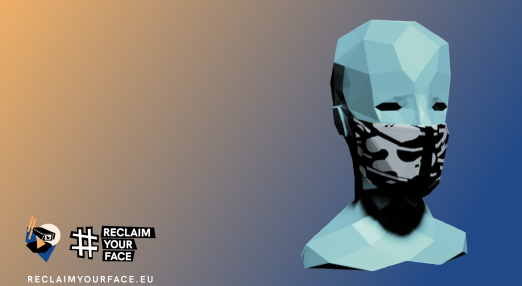surveillance
Filter by...
-

Council of Europe’s Actions Belie its Pledges to Involve Civil Society in Development of Cross Border Police Powers Treaty
As the Council of Europe’s flawed cross border surveillance treaty moves through its final phases of approval, time is running out to ensure cross-border investigations occur with robust privacy and human rights safeguards in place. The treaty’s drafting process has been deeply flawed, with civil society groups, defense attorneys, and even data protection regulators largely sidelined.
Read more
-

Booklet: Depths of biometric mass surveillance in Germany, the Netherlands and Poland
In a new research report, EDRi reveals the shocking extent of unlawful biometric mass surveillance practices in Germany, the Netherlands and Poland which are taking over our public spaces like train stations, streets, and shops. The EU and its Member States must act now to set clear legal limits to these practices which create a state of permanent monitoring, profiling and tracking of people.
Read more
-

Five reasons to claim victory on the EU Digital COVID Certificate
On 8 June 2021, the European Parliament voted on the interinstitutional compromise text on the regulation(s) on the EU Digital COVID Certificate (EU DCC, also known as the Digital Green Certificate and the European Green Pass). The proposed legislation regulates the “framework for the issuance, verification and acceptance of interoperable certificates on vaccination, testing and recovery” with aim of facilitating free movement during the COVID-19 pandemic.
Read more
-

How Europol’s reform enables ‘NSA-style’ surveillance operations
“More than 100 million”. That’s the number of encrypted messages that French and Dutch law enforcement announced they had collected after infiltrating Encrochat in 2020, a company selling encrypted communication services and devices, writes EDRi's Chloé Berthélémy.
Read more
-
Booklet: How online ads discriminate
The risks and harms that are associated with hyper-targeted online ads have been widely documented. Yet, the same amount of attention has not been shown to the many ways in which harms and risks of online advertising are unequally distributed, and how targeted online advertising can have discriminatory effects. This is the focus of EDRi’s newly launched report.
Read more
-

Panoptykon ends campaign against uncontrolled surveillance reaching 3M people
1 out of 5 Poles are aware of the constantly growing powers of the Polish secret service. And this lack of knowledge from the public leaves the door open for further expansion of the powers of secret service authorities.
Read more
-

Europol inches closer to increasing its powers despite lacking accountability
Europol was caught breaking the law and developing new initiatives without any proper legal basis (e.g. Europol’s innovation lab). Many proposed changes to Europol's mandate show an attempt to legalise the agency’s unlawful activities. In addition, this revision is happening even before the first implementation evaluation of Europol’s Regulation, planned for 2022, has been carried out. Without this evaluation, it is impossible to assess whether the current rules impede the fulfilment of the Agency’s missions and whether its working practices respect fundamental rights.
Read more
-

The urgent need to #reclaimyourface
The rise of automated video surveillance is often touted as a quick, easy, and efficient solution to complex societal problems. In reality, roll-outs of facial recognition and other biometric mass surveillance tools constitute a systematic invasion into people’s fundamental rights to privacy and data protection. Like with uses of toxic chemicals, these toxic uses of biometric surveillance technologies need to be banned across Europe.
Read more
-

European Court on Human Rights Bought Spy Agencies’ Spin on Mass Surveillance
For good or ill, and I believe for ill more than for good, with the present judgment the Strasbourg Court has just opened the gates for an electronic “Big Brother” in Europe. EDRi's member Electronic Frontier Foundation (EFF) discusses the recent European Court on Human Rights' decision that the British and Swedish surveillance regimes violate privacy.
Read more
-

UK: European Court decision in Big Brother Watch case does not go far enough to protect free expression and privacy
The finding of a violation is testimony to the doggedness of civil society in holding the UK government to account in the wake of the Snowden revelations about mass surveillance programmes. EDRI's member ARTICLE 19 welcomes the decision of the European Court of Human Rights (European Court) in Big Brother and others vs the UK, which ruled that the United Kingdom’s bulk interception of communications violated the right to privacy and failed to protect journalists in breach of the right to freedom of expression.
Read more
-

Human rights groups win European Court of Human Rights claim on UK mass surveillance regime
Eight year legal battle against UK mass surveillance programmes exposed by whistleblower Edward Snowden culminates in victory for privacy. EDRi's member Privacy International worked actively to make this happen.
Read more
-

Can a COVID-19 face mask protect you from facial recognition technology too?
Mass facial recognition risks our collective futures and shapes us into fear-driven societies of suspicion. This got folks at EDRi and Privacy International brainstorming. Could the masks that we now wear to protect each other from Coronavirus also protect our anonymity, preventing the latest mass facial recognition systems from identifying us?
Read more
